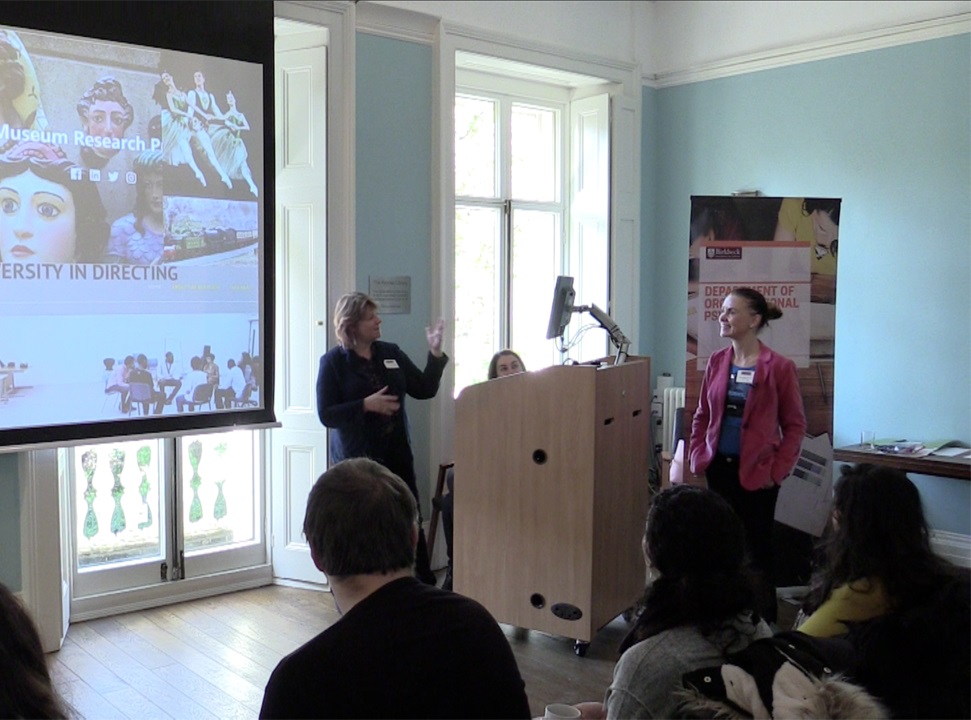Professor Almuth McDowall led a lively and thought-provoking discussion at the first School of Business, Economics and Informatics Breakfast Seminar of the academic year.
On a crisp, autumnal Monday morning, academics from Birkbeck’s Department of Organizational Psychology, were joined by students, colleagues and professionals working in or with an interest in the performing arts for the first BEI Breakfast Seminar of the academic year. Rebecca Whiting hosted the seminar as this links to the department’s wider interest of working with culture, arts and the creative industries.
Professor Almuth McDowall, who was leading the discussion, began by explaining why the performing arts had become a special interest for her department. The performing arts are the largest employer in the arts and culture industry, yet there are many elements of the sector that need to be better understood. Curiously, the sector is notably absent from UK wide employment surveys and statistics such as the Work Employment Relations Survey, especially when it comes to improving work life balance. Work in the performing arts is often cyclical in nature, unpredictable and subsidised by another job to make ends meet. This is a sector where job sharing makes headline news.
Career penalties in the performing arts
Professor McDowall shared the key findings of Balancing Act, a survey carried out by academics from the Department of Organizational Psychology in collaboration with Parents and Carers in the Performing Arts (PiPA). While performing arts professionals are highly engaged at work, there is a toxic mix of high levels of job insecurity with low levels of employability. Of those who were surveyed, 54% didn’t have full time contracts, in contrast to 15% of the general population, and those with caring responsibilities were much less likely to be in full-time, secure roles.
Women were found to be disproportionately affected by precarious working practices than men due to the ‘second shift’: cooking dinner, making sure birthday cards are bought and continuing to ‘work’ in many ways once their paid working day has finished.
Women also suffer a pay penalty in an already low-paid industry; the median part-time earnings of women surveyed were £5,000 less than men, suggesting that they have to rely on social and financial capital outside of work in order to pursue a career in the performing arts.
When it comes to caring responsibilities, 44% of women and 36% of men have had to change their work roles for this reason, for example, by not touring, or choosing not to work in the West End in order to spend more time with the family.
Furthermore, respondents who had left the performing arts industry did so almost unanimously to become a parent, with those able to continue their career relying on their social capital (partners, friends or family) for support.
In an environment that is practically hostile to working parents, 12% of respondents reported facing discrimination and bullying at work, with one survey respondent warning that “[t]he industry will not care for you”.
The case for change
So, Professor McDowall asked the room, is the ‘deal’ in the arts to accept job insecurity? As a woman, should you try to marry rich, since that’s strategically your best career move? Since performing arts workers are ‘lucky’ to be doing a job they love, should they just keep quiet about the downsides?
As an alternative to accepting the status quo, PiPA has developed a best practice charter for the performing arts industry, starting with recruitment. Professor McDowall stressed that practical solutions do not have to be expensive or call for extra resource, they can be as simple as giving performers and backstage workers more notice of future scheduling.
She also called for more research in order to understand the role that social capital plays in the workforce, and how to equip people working in the arts to craft their careers and negotiate a better deal.
The talk was followed by a passionate discussion from industry professionals both seeking support and sharing best practice. In response to a question about the biggest barrier to change, Professor McDowall suggested that organizational culture remains a barrier, and that more work needed to be done to “research into the active ingredients that will promote culture change in the performing arts, as it’s not an industry where there is a lot of time to reflect and take stock.” The demands of the arts simply require that often getting the next production on stage will take priority over more people focused activities.
Far from just accepting the status quo then, the morning ended with positivity that change can be made in the performing arts industry, since, as Professor McDowall put it, “surely there is an onus on the performing arts to better reflect society?”
Further Information:

